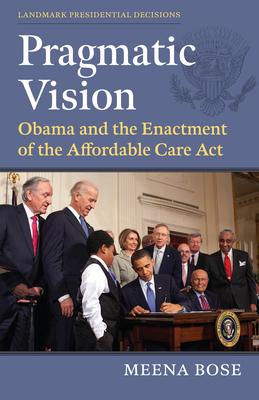On March 23, 2010, President Barack Obama signed the Patient Protection and Affordable Care Act into law, providing every American with the opportunity to have guaranteed health care coverage. The Affordable Care Act--frequently referred to as Obamacare--is almost synonymous with Obama's presidential legacy and reflects a series of key decisions that he made beginning before he took office. As Meena Bose shows, it was Obama's particular brand of pragmatic politics that ultimately shaped the passage of the Affordable Care Act and made a lasting mark on health care reform in the United States.
Pragmatic Vision examines eight of Obama's decisions that resulted in the landmark enactment of health care reform, starting with his commitment to health care reform in the 2008 presidential campaign and concluding with his decision to allow for flexibility with its implementation, following technical hurdles and Supreme Court rulings. Bose shows that Obama's steadfast commitment to the issue was crucial to its passing, especially after the Democrats lost their filibuster-proof majority in the Senate. Obama's direct engagement built key political support for the legislation and was aided by the senior White House staff and Democratic leaders in Congress who skillfully navigated the bill to passage just fourteen months after Obama took office.
The story of Obama's leadership in enacting the Affordable Care Act is a tale of today's partisan divide and the polarization of Congress. The legislation passed on a party-line vote and continued to divide politicians long after its passage. Nevertheless, despite repeated efforts by Republicans to repeal the law, it is more popular today than ever and seems destined to remain in force until the next stage of reform. Pragmatic Vision is an authoritative guide to this singular achievement of the Obama administration.
